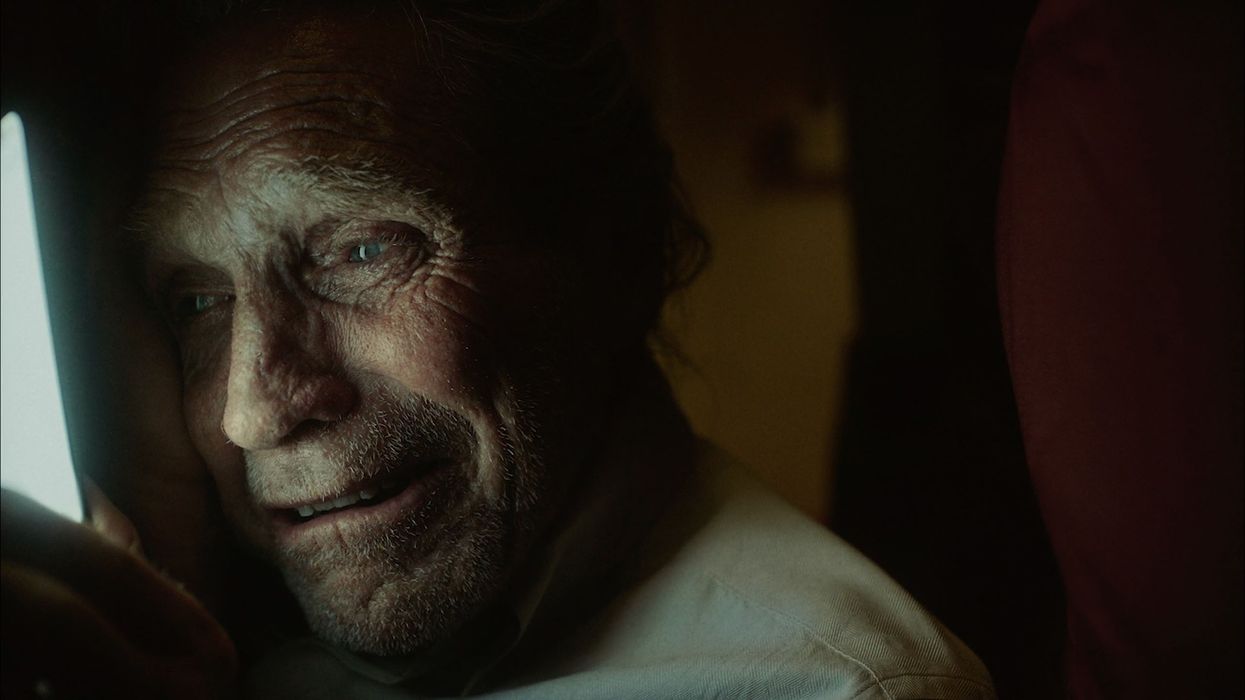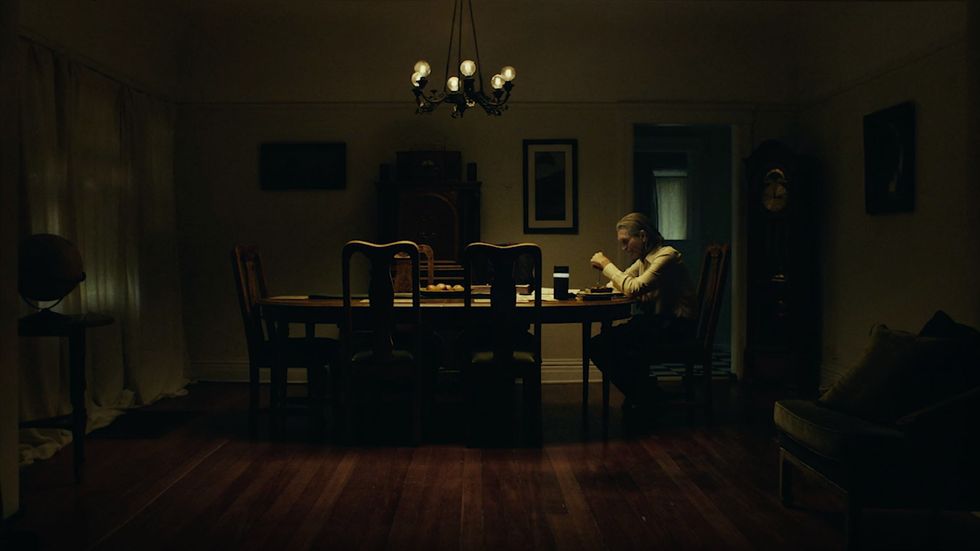How Do You Win Big at Sundance? Ask Horror Filmmaker Masha Ko
No Film School speaks with award-winning filmmaker Masha Ko about her Sundance short film.

Joseph Lopez appears in "The Looming" by Masha Ko, an official selection of the U.S. Shorts Program at the 2024 Sundance Film Festival.
It's been a very good Sundance Film Festival for Masha Ko, the filmmaker behind the horror short The Looming, which just this week premiered in the Midnight Short Film Program and was awarded a Short Film Special Jury Award for Directing from Sundance. Ahead of the short's premiere, Ko also signed with Range Media Partners.
If there is any proof that a short at a festival can take you places, Masha Ko might be it!
The short is a moving piece following an elderly man who lives alone with only an electronic assistant for company. He starts hearing things, but no one seems to take his concerns seriously.
NFS was lucky enough to speak with Ko during the festival. We asked her about challenges of the shoot, the importance of flexibility, and more.
Leave the lights on for this one, and enjoy!
The Looming (2024) Trailer | Sundancewww.youtube.com
Editor's note: This conversation has been edited for length and clarity.
No Film School: I know that you're an artist, I know that you've produced pretty extensively. Can you tell me a little bit about your filmmaking journey?
Masha Ko: My mother was actually an actress, a TV and film actress back in Russia, so I pretty much grew up around that environment. People ask me, when did I first want to be involved in filmmaking? I think from the very beginning since I could remember, I wanted to be an actress actually. Growing up I was a part of a lot of theater productions in school, in college. But, then I fell in love with art and started making art. I also have a dance background as well. Then I realized that acting just doesn't fully do it for me. Instead of being in someone else's dream, I wanted to create my own dreams, basically. I think that's the best way to put it.
As a result of having all this vast array of things I was doing, I was choreographing, I was doing dance, then also I was doing installations and performance art. I wanted to find something that could incorporate, and I still of course had the biggest admiration and love for acting, especially since my mother was an actress. Because of that, I wanted to find something that could combine all these different artistic elements, and it just happened so to be directing. Of course, I love films. Horror films pretty much saved my life, so I typically say that.
NFS: I know that you created this short after losing your grandfather. Can you talk a little bit about the development of the story, and also how you arrived at the concept of that monster and the story itself?
Ko: Yes, because my grandpa's death came very suddenly, it was a very disorienting experience. I think I wanted to make this film as a way to find meaning in all of this, and in a way, I made it my focus to make the film beautiful somehow, to beautify this terrible experience because the reality wasn't. I guess this was just my way of saying goodbye to him because I never got to say that. In a strange way, to have something come out of it that has meaning, because the whole situation didn't feel like it had any meaning.
So I started writing a story. I'm also an artist, so I actually wasn't sure if I should make an art piece about it or if I should make a story. But, after talking to many people, I realized that this is actually a stark reality that is present for so many people around the world. I wanted to take my experience and kind of abstract it in a way and make a bigger case about forgotten people, people whose experiences are not celebrated through artistic forms because they're not cool, they're not hip. These are elderly we're talking about, this is dementia. It doesn't sound like a hot topic. That's why I actually wanted to make a film and have the lead be 70 years old, and again, make this bigger statement about aging and being alone at the end of your life. It's shocking how this is a reality for so many people.
NFS: You actually switched locations at one point, and I found that a little bit surprising for a short film, which starts out so contained.
Ko: Absolutely. In terms of locations, it's an interesting story. We do have this big office, and that's a great story how we got that big office. Basically, our production designer/producer/actor, Kolten, I don't know if you saw this actor who's mean to our man in the office, he's also a producer and he's also a production designer. He pretty much ran around town and was asking every office if we could film in there for free. We both did that, but it was mainly him. Then, eventually, we found this very nice real estate firm, and they allowed us to shoot there for free. It's such a big space, and of course, I definitely want to give a shout to John Cataldo. It's his real estate firm. He allowed us to do it. We would've never been able to afford it otherwise. We got really lucky when it comes to that. The house was an Airbnb, so we had that house for two days.

NFS: You mentioned it in the previous question about how you were aiming for this beauty, and Sundance itself called it "terrifyingly beautiful." How did you nail that tone and that visual style?
Ko: Thank you. I think when it comes to visual language, the big challenge I had is that I wanted it to be a dark, scary house. Right? But then when we were trying different things, I was also afraid for it to look too bleak and too depressing and not pretty. Not to say that everything that's bright is pretty, but my goal was to kind of create this dark, bright look, if that makes sense.
I think, and I believe, that we were able to achieve that. I think with a combination of the way we lit things and coloring, we were able to achieve this strange look, because the color is actually pretty potent if you look at it. It feels kind of bright, but it's still diluted in a way because of the way we treated it. That was the main goal, and I think we were able to achieve that.
Of course, we wanted to leave a lot of areas in the frame, in the shadows, because of my overall approach to horror, which is to withhold as much as possible for as long as possible because I believe that that's what makes things scarier, rather than showing the monster. Because the moment you show the monster, everything is anticlimactic after that. You have to work really hard as a director to make sure you keep the tension going after the audience feels like they could understand the monster. That was the reason.
NFS: I know that making anything is so challenging, but can you talk about any other challenges that you had while filming the short and how you overcame them?
Ko: Absolutely. I mean, we had a great challenge. Basically, the very last scene, when Chester runs into the bedroom, slams the door onto the monster, that whole scene is pretty much improvised, basically, because we had a huge issue that happened on set. Basically, at the end we were supposed to reveal the monster. The monster is supposed to get there. It was supposed to still be the same story. The way we made the monster, it actually had the face of our actor. We took a mold of the actor's face. The ending was going to be a little bit different—same idea, but a little different. But, then because of an issue that we had on set, we could no longer shoot that.
I took my DP and AD, and I locked them in a room for 30 minutes, and I was just like, "You guys, what do we do? We don't have the lead character ready." The whole focus was supposed to be on the monster at the end. I kind of sat on the floor, and I started thinking, from the story, what is the most important thing? I started thinking how we could achieve that. That scene when Chester talks to his daughter under the bed, that's improvised too. He was talking to me on set, and we wrote those lines in post-production. Because it's a phone, we wrote the lines for Melody later and recorded those later. We were just improvising because we didn't have time to even write anything. We were losing so much time. I think that was a really huge challenge.
We walked out of set that day not being sure if what we did worked. We didn't know if that cut through the legs would work. We didn't plan or think about any of this. We just had this idea and I'm just like, "Let's do this." Thankfully, because I had a great team, everybody was able to quickly improvise.
I think that's because we rehearsed things. That was just a great challenge. I'm so lucky that I think if a big issue this happens on set, the best thing to do is just to return to the cord of your story and see how you could do that in another way. That's what we did. Again, I wasn't sure if, because in front of the bed, it was supposed to be the monster, not the same character. Long story short, yeah, it was a very big challenge, but we got lucky, I guess.
NFS: You've already given quite a bit of good advice, but what other advice do you have for up-and-coming directors?
Ko: I think for directors is to prepare as much as possible and to prepare on areas you feel like you don't need to prepare in. I truly believe in rehearsals with every department. With my DP, we rehearsed some shots. Even trying as much as you can to get that time with people, whether it's makeup, costume. In a way, if you spend time with each department, these people will also be inspired to bring in something new to set if you get them involved and engaged early on in a way that feels inspiring. To treat everybody like an artist in their own right so they could truly innovate inside of their own role, hopefully for the greater vision. I think the way to do that for the greater vision is to prep as much as possible prior to set. Because I believe that once you step on set, things should already be set everywhere as much as possible. I think that's the advice. Then that's how you will be able to improvise if something goes wrong, because something will always go wrong, most likely, even on really big sets, studio sets. Right?
But, if people are all on the same page in terms of where we're rowing to, then we could quickly recalibrate and find another way to express the same thing. I think that's my advice to directors.
No Film School's coverage of Sundance 2024 is brought to you by Canon.














